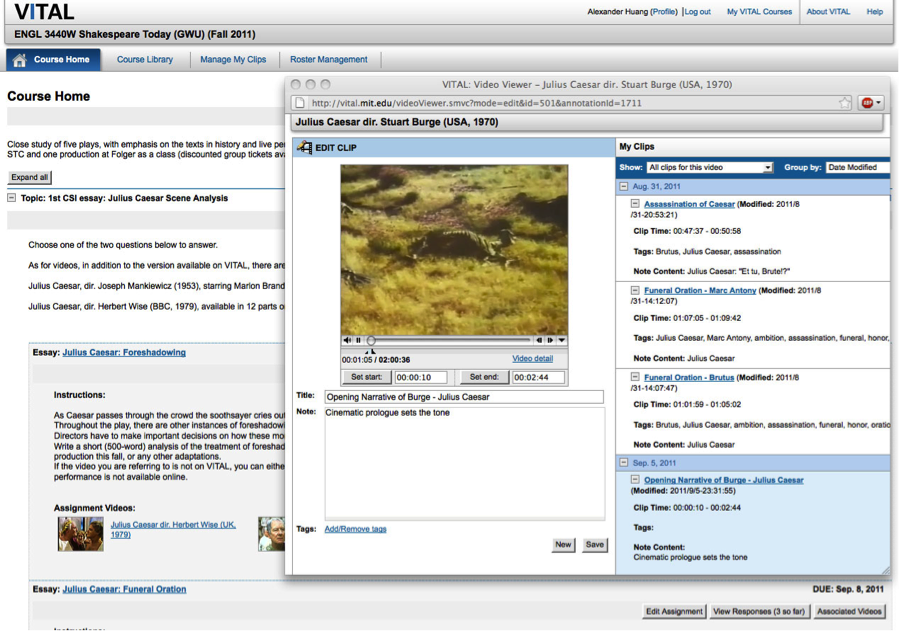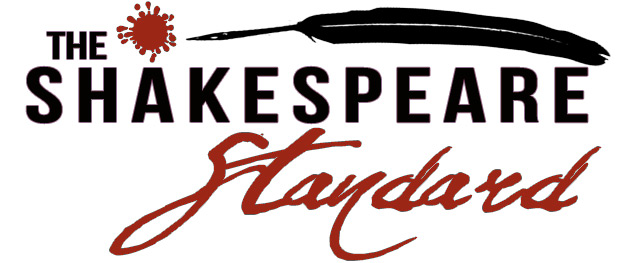This week concludes a two-part interview with Professor Alexander Huang of George Washington University.
He is Director of Dean’s Scholars in Shakespeare Program and Associate Professor in the Department of English, with affiliate appointments in Theatre and Dance, East Asian Languages and Literatures, and Elliott School of International Affairs. He is also part of the GW Medieval and Early Modern Studies Institute (MEMSI).Professor Huang has written several books including: Chinese Shakespeares: Two Centuries of Cultural Exchange (winner of multiple awards including the MLA Scaglione Prize); Weltliteratur und Welttheater: Ästhetischer Humanismus in der kulturellen Globalisierung; Shakespeare in Hollywood, Asia and Cyberspace co-edited with Charles Ross; and Class, Boundary, and Social Discourse in the Renaissance co-edited with I-chun Wang and Mary Theis. He is a general editor of The Shakespearean International Yearbook, and has guest-edited special issues of the journals Shakespeare, Asian Theatre Journal, and Borrowers and Lenders: The Journal of Shakespeare and Appropriation. Professor Huang is also a co-founder of the ambitious, impressive, and comprehensive website Global Shakespeares. We interviewed Professor Huang about Global Shakespeare for the 16 February edition of “A Great Feast of Languages |Interview with Professor Alexander Huang, George Washington University; Global Shakespeares Website |Global Shakespeare News” and Josh Magsam reviewed the Global Shakespeares website for the 23 February edition of “A Great Feast of Languages | Exploring the MIT Global Shakespeares Site | Global Shakespeare News.” This week, we talk to Professor Huang about his upcoming projects, teaching at GWU, and the Washington DC theatre scene. He even suggests some great foreign versions and adaptations of Shakespeare’s plays.
You teach at George Washington University. Which courses do you teach frequently? How do you bring your research into the classroom?
One of the courses I have taught at both the undergraduate and graduate levels at GW is Global Shakespeare, and I bring my research into the classroom via Global Shakespeares, its online learning modules, and a web-based program for developing critical thinking skills in a multimedia environment. I think of Global Shakespeare as a YouTube for Shakespeare lovers.
The platform I use in class is called VITAL (Video Interaction for Teaching and Learning), a program developed at Columbia and modified at MIT, that allows students to make their own multimedia content by splicing together clips from Global Shakespeare with their own writing about the work. The finished product can then be shown to the class to create a learning community.
A media-rich environment is the only way to get the job done when the goal is to teach performance and film analysis and critical thinking. The paradox of the age of YouTube is that despite the level of creativity and range of possibilities for teaching and learning, when videos and films are used in class, students slip back into the passive mode of viewing. I use multimedia in ways that compel students to engage with the materials in-depth and foster students’ writing skills.

How would you recommend incorporating the issues of global Shakespeare or globalization into the standard undergraduate Shakespeare course?
Global Shakespeare as a curricular component answers the competing demands of internationalizing education to prepare our next generation for a complex world and of sustaining traditional canons. There are many ways to incorporate issues of politics, reception, and aesthetics raised by global Shakespeare into standard undergraduate Shakespeare courses.
Teach the blessing and curse of globalization and localization in conjunction with Shakespeare. Teach familiar texts in strange settings. As Georg Wilhelm Friedrich Hegel reminds us, what is “well known” is never properly known simply because, well, they appear to be well known, which is why Folger Shakespeare Library research director David Schalkwyk once said that unless you have read Shakespeare in another language, you do not really understand Shakespeare.
(1) Reading Shakespeare in multilingual contexts is important. Consider for example these lines from Macbeth: “The multitudinous seas incarnadine, / Making the green one red.” The repetition of ‘incarnadine’ and ‘red’ is serendipitous, but the deliberate alternation between the Anglo-Saxon (Germanic) and the Latinate words suggests two pathways to and two perspectives on the world.
(2) Different cultural frameworks and translations slow us down and compel us to rethink what we assume to be familiar. Performances in world cultures can lead us back to Shakespeare’s plays with new insight and new paths for interpretation. Works such as Ong Keng Sen’s transnational and pan-Asian productions (Search: Hamlet, Lear, Desdemona, Lear Dreaming), Kenneth Branagh’s As You Like It with a strong Japanese motif, and Tim Supple’s multilingual Midsummer Night’s Dream with an all-Indian and Shri Lankan cast, are generating extraordinary artistic and intellectual energy by recasting gender, racial and social identities. The racial issue disappears by being recast as uneasy familial relations in Japanese interpretations of Othello, and it is made hauntingly present through its absence from radically localized, colorblind, Korean performances that seek to redress the wound of Japanese colonization. In the Chinese tradition of performing The Merchant of Venice as romantic comedy, the play is often retooled as an adventure of an attractive woman lawyer or an outlandish tale involving a pound of human flesh. This framework has activated elements of the play that, over several centuries of Anglo-European readings, have become obscure to communities that gravitate towards the ethics of conversion as a key site of tension in the narrative. Other examples of reconfigurations of the center and the periphery abound. These works have led to the transformation of traditions occurring in both directions at once.
(3) It is important to appreciate the historicity of global Shakespeare as a cultural phenomenon that is not exclusive to the modern era. Translation was an unalienable part of the cultural life in early modern England. Translation, or translatio, signifying “the figure of transport,” was a common rhetorical trope that referred to the conveyance of ideas from one geo-cultural location to another, from one historical period to another, and from one artistic form to another. London witnessed a steady stream of merchants and foreign emissaries from Europe, the Barbary coast, and the Mediterranean, and thousands of Dutch and Flemish Protestants fled to Kent in the late 1560s due to the Spanish persecution. Within Shakespeare’s plays, the figure of translation looms large.
Henry V contains several instances of literal translation, including the language lesson scene and the well-known wooing scene. Translation serves as a figure of transport, theft, transfer of property, and change across linguistic and national boundaries, as the characters and audience are ferried back and forth across the Channel. The “broken English” (5.2.228) in the light-hearted scene symbolises Henry V’s dominance over Catherine and France after the English victory at the Battle of Agincourt. However, the Epilogue reminds us that the marriage is far from a closure (Epilogue 12), for it produces a son who is “half-French, half-English” (5.2.208). The English conqueror pretends to be a wooer to Catherine of France who cannot reject him freely. One is unsure whether Catherine is speaking the truth that she does not understand English well enough (“I cannot tell”) or just being coy—playing Harry’s game, though Catherine eventually yields to Henry V’s request: “Dat is as it shall please de roi mon père” (5.2.229). A play such as Henry V and its global afterlife (for example, Laurence Olivier’s film version during World War II as propaganda) provide rich material to be mined to teach various aspects of international relations and to further students’ understanding of Shakespearean aesthetics.
(4) If you have a diverse classroom, take advantage of students’ different backgrounds and experiences. Turn international students who are not native speakers of English into your asset. All too often they are seen as a liability, but their linguistic and cultural repertoire should be tapped to build a sustainable intellectual community. Take The Tempest for example. What exactly do Prospero and Miranda teach Caliban? The word “language” is ambiguous in act 1 scene 2 (Caliban: “You taught me language …”). It is often taken to mean his master’s language (a symbol of oppression). But it can also mean a new tool for him to change the world order. One way to excavate the different layers of meanings within the play and in performances is to compare different stage and film versions from different parts of the world. Students can even try to translate a passage and share their rationale with the class. Caliban’s “language” is translated variously in different languages. In Mandarin Chinese it is rendered as “human language”, 語言, as opposed to languages of the animal or a different system of signification. Christoph Martin Wieland translates the word in German as redden, or “speech”. Caliban may know how to curse in his own language before Prospero takes over his island, but he now has one more language in his arsenal.
Take another word from The Tempest. Prospero announces in act 4 scene 1 that “our revels now are ended.” The word “revels” in the Elizabethan context refers to royal festivities and stage entertainments, but it carries different diagnostic significance in translation. Christoph Martin Wieland used Spiele (plays) and Schauspieler (performer) to refer to Prospero’s masque and actors (“Unsre Spiele sind nun zu Ende” in German). Sometimes translators working in the same language have different interpretations. Liang Shiqiu translated it as “games” in Mandarin Chinese in 1964, alluding to the manipulative Prospero’s “games” on the island, but Zhu Shenghao preferred “carnivals” (1954), highlighting the festive nature of the wedding celebration.
Act 1 Scene 3 of Othello offers another interesting instance (which is the focus of Tom Cheeseman’s Version Variation Visualization: Multi-Lingual Crowd Sourcing of Shakespeare’s Othello):
If virtue no delighted beauty lack,
Your son-in-law is far more fair than black.
Translations of these lines into different languages deal with the meanings of “fair” and “black” rather differently. Mikhail Lozinskij’s Russian translation says “Since honor is a source of light of virtue, / Then your son-in-law is light, and by no means black.” Christopher Martin Wieland and Ángel Luis Pujante used white in German and Spanish (respectively) to translate “fair,” while Victor Hugo chose “shining.” It’s eye opening to see how translation opens up the text in new ways.
(5) Class units can be designed around watching videos on Global Shakespeares and
discussing the English subtitles. It is eye opening for students to
experience Hamlet’s “to be or not to be” speech in languages other than
English. The vague, versatile, and “Swiss-knife” verb “to be” is as
ambiguous in English as it is in many other languages. Sometimes it is
translated as “to have” (but to have or not to have what!?), to do, to
die, and so on. Go to this page to listen to the speeches.
There you will find “to be or not to be” in several languages drawn from actual performances:
- English [Gielgud Hamlet]
- Arabic [Sobhi Hamlet]
- Assamese (Indian dialect) [Hazarika Hamlet]
- Brazilian Portuguese [Correa Hamlet]
- Japanese [Kurita Hamlet]
- Korean [Yohangza Hamlet]
- Mandarin [Hamlet Unplugged]
- Swedish [Lyth Hamlet]
(6) One can also build into a Twelfth Night unit issues of gender, world cultures, and Shakespearean performance. Japanese is a language more complex than English from a sociolinguistic point of view. Performing the play in Japanese is therefore a challenge. One would have to wrestle with more than 20 first- and second-person pronouns to maintain the ambiguity and subtlety of gender identities. In addition to making the right choice of employing the familiar or polite style based on the relation between the speaker and the addressee, the male and female speakers of Japanese are each confined to gender-specific personal pronouns at their disposal. Before a translation can be undertaken, decisions will have to be made on the register and gendered expressions to convey Orsino’s comments about love from a male perspective and Viola’s apology for a woman’s love when in disguise as Cesario, or the exchange between Rosalind in disguise as Ganymede and Oliver on her “lacking a man’s heart” when she swoons, nearly giving herself away (4.3.164-176). But limitations create new linguistic and cultural opportunities. Translational moments like this can launch interesting discussions about visible and invisible gender identities in Twelfth Night.
(7) Interdisciplinarity. Global Shakespeare is a great topic for inquiry-driven learning. It is often assumed that materials to be presented in the undergraduate classroom have to be dumbed down, and that students will be overwhelmed by interdisciplinary approaches. The opposite is true. Students love a hands-on approach to create and share knowledge, to build on existing theories to explore new frontiers. As a broad field, global Shakespeare allows students to make fresh contributions. Beyond Global Shakespeares, many other archives can help students make transhistorical connections between issues and build cross-cultural understanding of arts. For example, Early English Books Online (EEBO), and the Folger Shakespeare Library’s LUNA.
You are very busy, but you still find time for your own research. What are you currently working on?
A number of things. I just published a book in German on humanism. Weltliteratur und Welttheater: Ästhetischer Humanismus in der kulturellen Globalisierung [World Literature and World Theatre: Aesthetic Humanism in Cultural Globalization] (Bielefeld, Germany: Transcript Verlag, 2012) argues that aesthetic humanism–as a secular investment in shared cultural values–counters various practices of subjugation such as colonialism and cultural imperialism that have dominated the recent historical record of globalization. This is notable in the translation and adaptation of Shakespearean comedies and sonnets, and the satirical and humorous narratives of Lu Xun, Mo Yan (2012 Nobel laureate), Gao Xingjian (2000 Nobel laureate), and other writers. This is the case because aesthetic humanism promotes multiple perspectives on the continuously unfolding revolution of modernity.
I am writing a book that introduces readers to diaspora—a new aspect of the global afterlife of Shakespeare in the context of touring performance. Diasporic Shakespeares are distinct from national Shakespearean performances, because they are designed for heterogeneous communities and incorporate elements from several cultures, as evidenced by works by British Indian, Asian American, Chinese Singaporean, Québécois (Francophone Canadian), and African and Caribbean Canadian artists. For example, Ong Keng Sen’s transnationally conceived and widely toured Shakespeare trilogy of Lear, Desdemona, and Search: Hamlet is informed by his diasporic position in crafting performance events that dramatize movements of people and ideas across borders and between imagined locations in Asia and the Anglophone world. The book shows how Western and Eastern diasporic playwrights and directors such as Robert Lepage (Canada), Djanet Sears (Canada), and Ong Keng Sen (Singapore) engage Shakespeare and shifting representations of local cultures in their works.
As a co-general editor of The Shakespearean International Yearbook, I have expanded the scope of the journal and launched a new feature of review essays. With a new advisory board and a new feature to track analogue and digital scholarship in and beyond the Anglophone academe, we are poised to make a difference.
What is your favorite Shakespeare play? What international performance or film version of this play did you most enjoy? Why?
It all depends on the season, time of day, and my mood. Right now it is Othello, and I really enjoyed Pier Paolo Pasolini’s 1967 Italian version entitled Che Cosa Sono Le Nuvole? (What Are Clouds Like?), an episode of a feature film that has become a brilliant short film in its own right. It is a smart play-within-a-film and parody–with prophetic visions–of the Shakespearean tragedy’s distorted image in its postcolonial afterlife.
In DC, which theatre companies do you frequent the most? What has been your favorite performance you have seen (Shakespeare or otherwise) in DC?
DC is such a vibrant city for Shakespeare activities. The Folger Theatre and Synetic Theatre are two of my favorite. Folger Theatre’s acclaimed 2003 Twelfth Night (directed by Aaron Posner) and 2008 production of Macbeth (by Posner and Teller, incorporating magic shows) are unforgettable theatrical highlights of the cultural life in town. Synetic Theatre’s physical theatre piece Taming of the Shrew in 2012 (dir. Paata Tsikurishvili) left me speechless. They burst onto the Shakespeare scene with a wordless adaptation called Hamlet…the rest is silence in 2002 (recipient of Helen Hayes Award) that jumpstarted their Silent Shakespeare Series. “Synetic” comes from synthesis and kinetic, according to the company. There is also Shakespeare Theatre Company in downtown DC, another amazing group that does Shakespeare Free for All every summer. Equivocation, a dramatization of Shakespeare’s life by Bill Cain, toured from Oregon Shakespeare Festival to Arena Stage on DC’s Waterfront, and I was deeply impressed by the mise en scène.
What are you reading right now for fun?
Pulitzer Prize winning astronomer and writer Carl Sagan’s Cosmos and Pale Blue Dot: A Vision of the Human Future in Space. Astronomy is a “humbling and character-building experience,” as Sagan aptly puts it. It is sobering to see the folly of human conceits in the immense temporal and spatial scale of the universe.
Can you do a top five essential global Shakespeare productions (available for viewing)?
The Speaker’s Progress, dir. Sulayman Al-Bassam (2011), inspired by Twelfth Night, in Arabic and English with English subtitles with multimedia
- A “retired” theatre director is sent abroad with a troupe of “envoys” to defend the image of their unnamed totalitarian homeland, which has banned all theatre. They present a localized Gulf Arab version of Twelfth Night. – from Margaret Litvin’s review of the production in Boston
Titus, dir. Julie Taymor (1999)
- Smart interweaving of different historical periods and modes of signification. Apocalyptic humor. A must see and a major milestone in Shakespearean cinema.
Romeu e Julieta by Grupo Galpão, dir. Gabriel Villela (1992), performed at the London Globe in Brazilian Portuguese
- Mix of comedy and tragedy, and formal and street-theatre presentational elements. Stilts, songs, and a carnivalesque atmosphere. What’s not to like?
uMabatha by Welcome Msomi (1970; 1997) in Zulu
- When Nelson Mandela was elected President of South Africa, he urged the play be revived. This bold adaptation (as dance and music event) is a celebration of Zulu culture and the enduring conversations between Shakespeare and his modern interlocutors.
Lear Is Here, dir. and perf. WU Hsing-kuo (2001), solo Beijing opera semi-autobiographical performance with English subtitles.
- The Taiwan-based Beijing opera actor plays 10 roles including his alter ego on stage. This is a visually stunning and intellectually refreshing story of an Asian actor’s soul searching and his engagement with one of the most profound Shakespearean tragedies.
The Banquet (also known as Legend of the Black Scorpion), based on Hamlet, dir. FENG Xiaogang (2006)
- Two words. Kungfu Hamlet. Exquisite masks, sword dance, and stylized presentation. Traditionally silenced characters in Shakespeare now have more outspoken roles.
Thank you again for your time and thoughtful responses!
The Shakespeare Standard is an online Shakespeare forum dedicated to bringing the online community Shakespearean news about performance, scholarship, and multimedia every day. Please join us here at our site or on Facebook or Twitter to discuss the latest things of interest in Shakespeare news.If you would like to share more information about a Global Shakespeare or non-Anglophone Shakespearean production, film, website, etc., please email me at colleenekh@gmail.com with the subject line “Global Shakespeare.”








